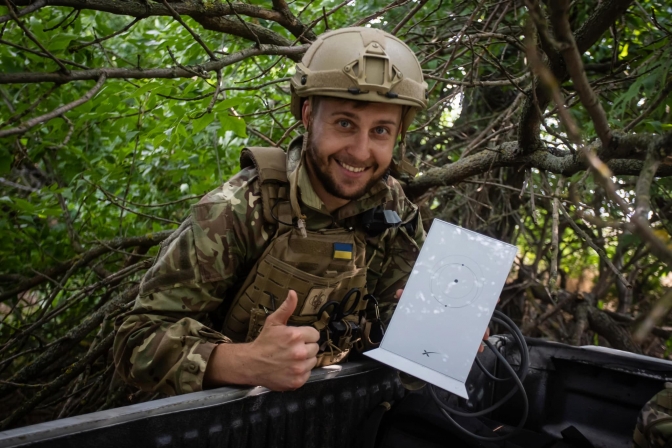
[For urgent updates please follow Ukrainian Freedom News on Telegram]
Roman Lozynskyi began his training at the age of seven together with the Ukrainian scouting organization «Plast». Now he is 28, but awareness of the century-old aggression of his northern neighbour motivated Roman to devote all his conscious life to the preparation for this struggle.
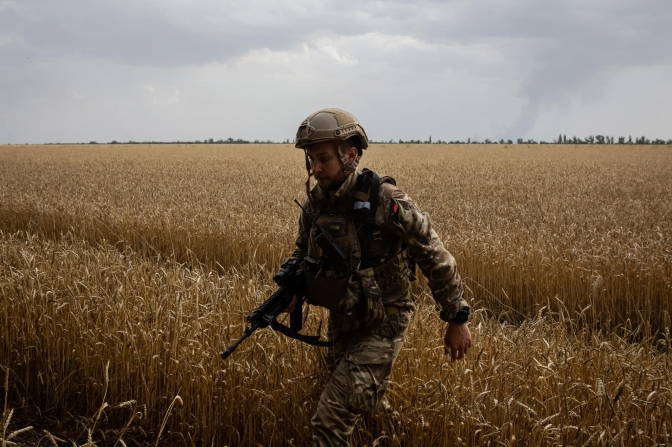
Roman went to war in the first days of a full-scale invasion. On the front line, he defended Ukraine with three of his best friends: Dmytro, Vitya-Kolya and Artem Dymyd. Unfortunately, Artem died in the war on June 18. We talked with a People’s Deputy of Ukraine from the «Holos» faction, a graduate of Ukrainian Catholic University, Roman Lozinskyi, about the loss of his comrade, deputys’ riffles at the front, his prayer, values, and vision of the future. The conversation took place within the framework of the Ukrainian Catholic University;s project «Little Histories of the Big War«.
«Be prepared»
You signed a contract in reserve when we couldn’t yet foresee a full-scale invasion. What prompted you to do this?
I have some inner feeling about this dangerous neighborhood. Probably, I took it from «Plast» scouting. I’ve been in this organization since being 7 years old, always went to military camps: mud, obstacle course, wooden machine guns, corn and pea grenades, trenches, and other. At one time, I didn’t fulfill my military duty because of my emgagement in politics, in elected positions, since I became a deputy at a young age. Still, I always felt that this service should be completed anyway. One must have military training, basic skills, understanding of structure and knowing his place in case of necessity. Therefore, in October 2021, I signed a three-year contract in the reserve, so that at least once a year for 2-3 weeks, I would go to training sessions and train. My first military meeting was to take place in the south of Ukraine from May 24. I’ve even received an invitation already.
That is, I always had the feeling that I had to be ready. It seems to me that even when we win, when this phase of the war is over, it does not guarantee the absence of new aggression. You have the right to relax! You have the right to rest, but you must keep your head and mind ready. Not in constant tension, because it is psychologically impossible, but you have to know where the first-need items lie, understand what you can do and hone these skills. It seems to me that this readiness for Ukrainians should become a part of the national idea.
I remember the video of the first days of war from empty Khreschatyk. I’ve never seen him like that in my life. What was the capital then, what was happening?
I remember the photo of February 24: along the Zhytomyr highway to the west, a long line of cars stretches into eternity. Women, children, elderly people were leaving, and we advised the routes, because in the north, the shelling and an offensive had already started. Everyone tried to help each other. I remember driving through Khreschatyk on the third day of the war. Czech hedgehogs had already been put everywhere, checkpoints, document checks… It was no longer possible to walk along Hrushevskoho Street, near the Verkhovna Rada: the entire government quarter on the Arsenalna side was blocked off. The Ukrainian armored car «Kozak» was displayed near the Lobanovskyi stadium and near the officers’ house. I understood that there came the war, which was felt for 8 years only by the residents of two regions. Now, every Ukrainian feels it.
Read also: Rebirth, or the way from punk rocker to a military doctor
Once a familiar military man asked me to help find armored vehicles near Hostomel. I took a small Ford Fiesta from a friend and we drove to Borodyanka, which wasn’t yet occupied at that time. We arrived at our checkpoint, and everything there was already serious. From the first days, our territorial defense was activated: the locals set up 4-5 roadblocks in one village and shook you like a Chechen at each of them. Everyone was ready to defend their house. In Borodyanka, I was almost taken to the commandant’s office, although the documents, language, «palyanytsia» – everything evidenced about me. At that moment, an older man ran up shouting that Russian equipment was coming, another one commanded: «Let’s disperse!», and the entire checkpoint ran in different directions. We got into the car and ran away. Columns of vehicles that entered the area fired at cars and civilians. We then just returned from Borodyanka and gave a signal to our military that here and there [Russians] had entered.
These first days looked somehow like this. That is, in general, the city wasn’t empty. There were people with weapons in the city. Someone was walking with a wooden stick. An echo of the Maidan was felt. Roadblocks appeared like mushrooms after the rain. Territorial self-defense was organized by district. We understood that people were leaving Kyiv, but at the same time, we felt there was someone to defend the capital.
How did you end up in defensive positions? You mentioned that you’ve got no combat experience.
I have been in Plast since childhood, and this cannot be underestimated. I did not realise this until a new phase of the war began. But it turned out that self-charging skills are universal. This is the base to which some narrow technical skills can be attached quite quickly. For example, I couldn’t fly quadcopters or adjust artillery, but that can be learned. When you have basic cartography skills, understand how to navigate, know what an azimuth is, then you can take tablets from the «Army SOS» charitable fund and understand how it works. Again, this is about readiness. If you have basic skills, you can use them in emergency situations.
The first three weeks we were at the training ground. And here it is worth paying tribute to the Armed Forces of Ukraine, who took the first blow. This is also an indicator of readiness. In the first weeks, no one was sent immediately to the front, because our contract professional army was repulsing a very powerful offensive. They won time for mobilization, reserves, and people like me. Even though it was only three weeks, I had the opportunity to walk in the forest, remember the sapper’s case so as not to get caught, shoot a machine gun, hold it in my hands, attend courses on grenade launchers and tank weapons, fly a quadcopter, and work with maps. We managed all this in three weeks, not a year, two, or three. Howver, as it turned out, that was enough to carry out certain tasks when we arrived at the positions of our comrades. We owe this, first of all, to our professional military, who, despite the scale of the invasion from all sides, surrounded by the Russian Federation from the border with Belarus and Poland all the way to Transnistria, were able to withstand and wait for the reserves, to which, in particular, me and my friends joined.
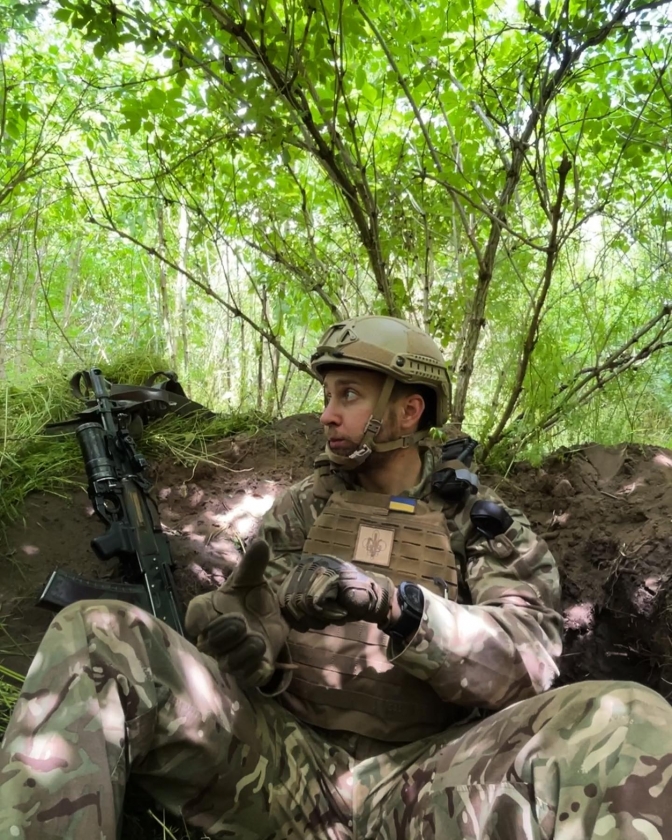
You often emphasize that perveive politics as your service. How do you manage to combine politics and military affairs now? I saw that you had registered draft laws. How is that even possible when you are standing close to the front lines where there is often no communication? How do you find time and resources for this, what motivates you?
To be honest, it’s almost impossible to combine. During these 4 months, I managed to be in the Verkhovna Rada once or twice. I understood that there would be no combat missions for several days and I knew about the scheduled meetings. Then I came and joined my colleagues.
Those draft laws I managed to register are works that had been more or less ready even before February 24. With a team of assistants, to whom I am very grateful, we registered them during one of my visits to the Verkhovna Rada. But in reality, it’s almost impossible to combine these two spheres: you either fight or vote. Therefore, in recent months I have practically not been engaged in parliamentary activities.
Read also: «We’ve lost a million dollars because we gave up Russia» – musician Taras Topolia
Currently, most critical functions are in the hands of the president, the National Security and Defense Council, and the government. Of course, among the decisions made by the parliament, there are also many important ones, and fortunately, almost all the people’s elected representatives who continue to work have remained in the country. If a question suddenly arose, for example, about the quorum and I understood that the deputies had fled, I would probably have to look for ways to be physically present during the voting. But since the constitutional majority is present at the meetings, it gives me the opportunity to fulfill my military duty.
Your great-grandfather Volodymyr was the head of the Ukrainian National Democratic Union’s secretariat. That is, from the very childhood, you were brought up in a patriotic spirit, with love for Ukraine. How did it influence your choice now?
I am grateful to my parents and my family for everything they gave me, starting from the environment and upbringing. I studied my family tree in my third year of university, when studying political science. That’s how I learned about [the first president of Western Ukrainian People’s Republic] Yevhen Petrushevych, who was my great-great-grandmother’s cousin, and Volodymyr Kuzmovych, my great-grandfather. But this is a relatively distant family, not immediate parents or grandparents. My mother is a music teacher in Lviv’s ordinary state school, my father is a civil engineer, my brother is a sports coach. My whole immediate family has always been proactive, but they’ve never been involved in politics. I have never seen a political example of them, it wasn’t a family thing. This is more about the roots. You sing songs by the fire or read a story and reflect on it, you understand how much the Ukrainians of previous generations have done, including your distant relatives. You feel that this matter must be continued.
How did your family, friends, girlfriend react to your choice to defend Ukraine with weapons in your hands?
At first, they were shocked but not surprised. I often talked about some of my feelings, they knew about my desire to do military service, about my desire for military affairs even in «Plast». Everyone understood the risks, parents were worried. But at the same time, they supported me.
How did your perception of war change when you became a direct participant in it?
I felt great pride for Ukrainians. When you see all these people around, and not just read about them, you realize what cool people they are. They have completely different experiences: someone has a large family, other does not have one. Someone once fought, other picked up a weapon for the first time, someone is a technical person, and other is a humanitarian. But the colossal synergy of society is felt in war.
I remember when I joined the unit at the beginning of March, we had already no vacancies. Friends and acquaintances wanted to join, but there were no more places. This is an indicator. This is power.
There was also pride for my surrounding: graduates of Ukrainian Catholic University, the Ukrainian Academy of Leadership, «Plast» – they are all here.
Although sometimes, it hurts a lot. Gradually, your Facebook becomes a collection of obituaries. It’s very unfortunate, but we have to understand it and to talk about it. Because it is also about feeling the price of struggle and victory. Sooner or later, we will win, but for many, the question will arise: «What does victory mean next? How will we continue to build our country?». Every time we should remember the names of those who gave their lives. Unfortunately, when you directly join a war, many of your friends and close people are injured or killed in action. This is a painful moment. But then, we feel that we should do even more. Not only for Ukraine or for our environments, cities, communities, but also in memory of the dead, so that all this was not in vain.
«Kurka» is already a senior sailor…
The tragic news that shook everyone at UCU is the death of your comrade Artem Dymyd. How are you coping with this loss? How do you remember Artem?
The military is not an organization where you choose what you want. This is a clear vertical. You may know friends and relatives who were mobilized and are ready to defend Ukraine, but you cannot act so that you are all in the same unit, in the same battalion, or in the same brigade. When I was driving to the meeting place, I already knew that my friend Dmytro would be there. Immediately on the spot, I saw a few more acquaintances, in particular Artem Dymyd and another colleagues, a «Plast» member from Volyn, with the nickname Vitya-Kolya. And it was very cool. We gathered there without agreeing it in advance. We called each other before, but I didn’t understand that there would be other guys besides Dmytro.
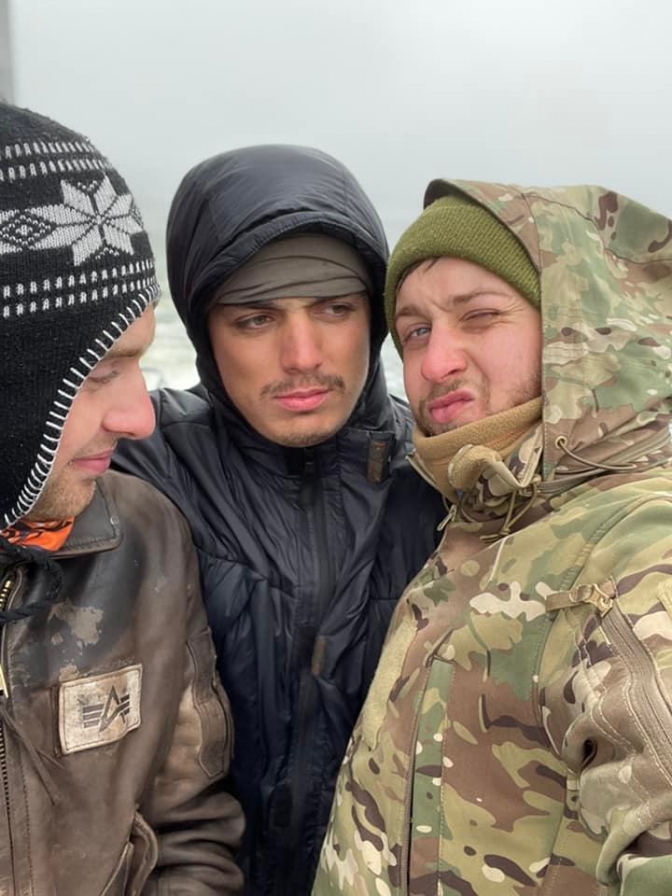
We performed combat missions together, rested, traveled together and changed locations. We talked and reflected a lot about this war, about the fear of death and loss. When Artem died while performing a combat mission, there happened what we feared the most. He was seriously injured, but we believed until the last that there was a chance... It’s harder than when one of your relatives or loved ones dies... This is a brother with whom you spent the last months inseparable. It hurts a lot. Although at the same time, we understand that this is a sacrifice that should be appreciated. We must become better, give more, sacrifice, because other people sacrifice even their lives as Artem did.
Perhaps you have some special stories related to the four of you, including Artem, which you would like to share?
When we all got together, it was really cool. Somewhere in the first days, we found out that we were sailors, because this is a maritime center, where all ranks and names are maritime. We laughed a lot about it, and it added some romanticism. War is loss, death, struggle, but it is also a kind of romance. We were joking about it and once, Artem Kurka (this is his nickname and military call sign) said: «I would like to become a senior sailor.» This surprised us, because statuses, formalities, badges, symbols were never important to him. It was always determined by content, not form. And then he says: «I would like to become a senior sailor.» It was unexpected. When Artem died, I tried to find out how it was possible to make it so that he received the rank of senior sailor posthumously. It turned out that he was already a senior sailor. Artem did not know about it. But now, he knows. Even on the cross under which he was buried, there’s an inscription «senior sailor». «Kurka» is already a senior sailor...
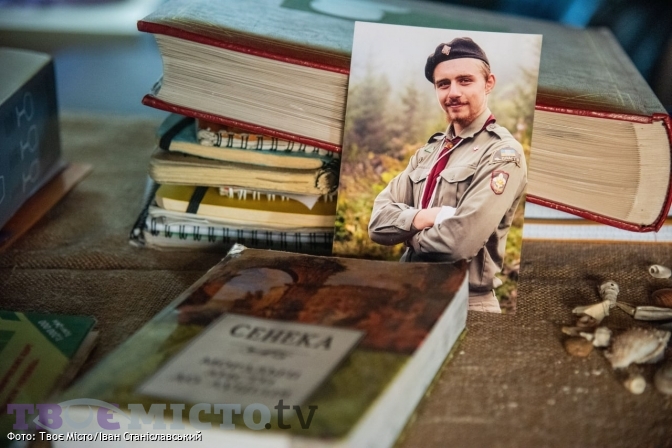
In one of the Facebook posts, I saw a story where one of your four comrades asked Artem to take care of him, to provide a burial if he died. However, the opposite happened. Can you tell us more about it?
It was a conversation between Artem and Vitya-Kolya. Vitya-Kolya imagined how it would all look for him. Someone wanted oak cross, others something else, someone wrote a will. It’s a little strange when you talk about death to your friends who are 25-27 years old. But we all knew what could happen. We weren’t talking the trips we were planning for the summer, but discussing our last day. In my opinion, this is a very strong trait, to always be ready for anything. Because when you entertain yourself with illusions that everything will be over in 2 weeks and everything will be cool, and it doesn’t happen, this line between expectations and reality creates a gap that turns into depression and unrealistic expectations. It makes a person weaker. Instead, to talk about how you see your last day is to have inner strength. Spiritual strength, not just physical.
There are a lot of emotions, a lot of fear in war. Were you afraid and what did you do in such moments? Have you ever reassured others?
We are constantly afraid. Any sane person is afraid when he hears explosions near him or shots fired at him. But it’s important how you act in a state of fear. Will you become numb and thereby weaken your colleagues, comrades, who will have to pull you out of that state, or will you be able to hold yourself in your hands? You have to be ready to master fear. It’s like a horse that you jump on and ride on. Everything else depends on the circumstances. Acting, withdrawing, retreating, or even running away is okay, especially when it’s coordinated, when it’s not running away from the battlefield but avoiding unnecessary risk.
We had several such cases. I remember how I put a tourniquet on my comrade. Lots of blood, I’m scared because I’ve never done this before. However, I understood: you either save a person, or you become numb with fear. It’s difficult to overcome fear, it will still remain with you, but you must be able to take this fear under your control.
Read also: «To take the wounded over the night, we drive to the touch.» war story of a paramedic
It was the most difficult for Vitya-Kolya, who is our paramedic. Artem died in his arms. He tried to help the comrade, to increase Artem’s chances of survival to the last... Was he, like the paramedic, afraid? Yes, he was. But, at the same time, he was doing his job. Those who go on the offensive are afraid, but they understand they are going to win back our country. Those who defend themselves are afraid, but they understand that once they leave, it will be one step closer to the home of the people who live behind. Therefore, fear is always with you, but there is management of expectations, there is time management, and there is management of fear. I can probably teach at UCU (smiles).
Do you think this war has changed you?
I think so (smiles). This war changes a lot. A very important skill for me is the ability to reflect. It turns out that not all people have it. I thought that most people were ready to talk about their experiences somehow, but it turned out that some just shut down and keep everything to themselves. The four of us: with Artem, Dmytro and Vitya-Kolya, always tried to discuss everything. I think that when we talk about something, we also become stronger. Because the quality of reflected experience is completely different. I am not sure that those who are now in the Armed Forces or in other formations protecting the country, understand how much each of us has changed. I do not fully understand how much I’ve become different. But then, when we win, I will go somewhere in the mountains and catch Zen, make a fire, hopefully with my brothers, friends, loved ones, and we will talk about it. Then we will better understand who we have become and what we will be in the future.
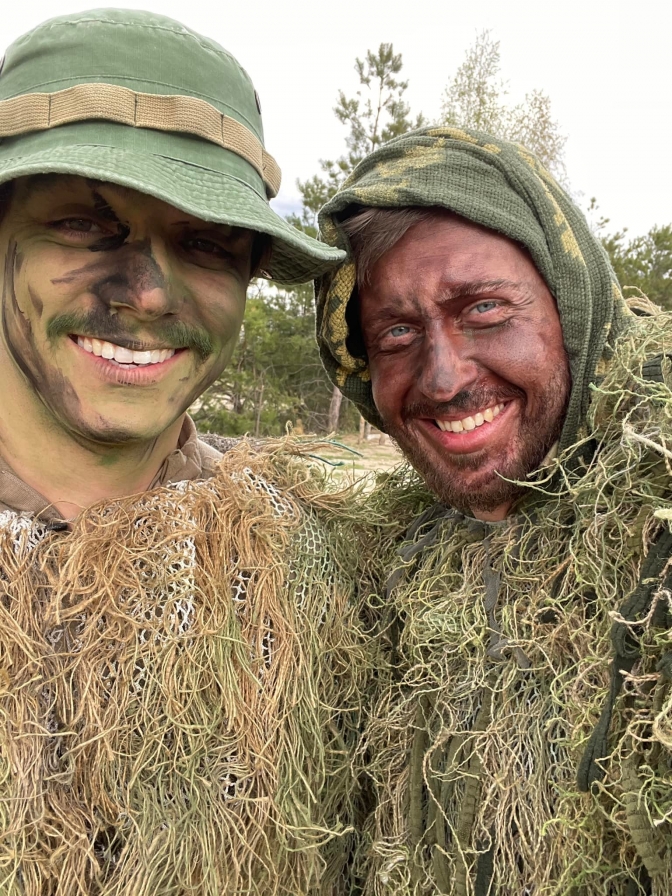
Tell us about your friends, how has your environment changed? What mood prevails?
In such circumstances, you discover people in a new way. These are people who are used to planning their tomorrow, but now they don’t know what will happen next. People who did not fight, but are now fighting. People who used to wear suits and now wear camouflage. This whole environment that has gathered there in this war is a powerful force, it is such a fist that is now hitting the enemy in the teeth. And the strongest is the feeling of elation. Another feeling is the desire to save as many lives as possible. We understand that war is always losses, but you can try to reduce these losses and minimize risks with your decisions. So it’s nice when people get involved and make suggestions. There are officers who serve all their lives, and there are people without experience who are ready to give suggestions. Artem was like that. Very often, when we planned our combat tasks, «Kurka» gave such suggestions that reduced the risk. We had to go out there somewhere, and he says: «Why do we need these quadrocopters? Let’s just fly.» It doesn’t sound like a huge innovation, but in those conditions, it could save someone’s life. And this is also exciting.
It is important that this elevation does not throw us into the abyss of unrealistic expectations. You should always understand that all this can last a long time. There will simply be another phase, another stage. There may be less fighting, less casualties, there may not be tanks and missiles, but this struggle will continue. We are now talking mainly about those who are fighting, but the front is much bigger, wider, deeper. And, to be honest, without volunteer help, without those people who are now not in camouflage, but are also fighting, raising the economy, paying taxes, making their contribution – we wouldn’t last. They also fight and stand guard. The team of people who are currently defending the country and will later rebuild it is much larger than the Armed Forces.
What keeps you going emotionally and physically? What motivates you to do your job?
Motivation in war is a defining thing. We always say that your skills in a stressful combat environment always fall to the level of your previous training. Likewise, in conditions of constant fear, pressure, and danger, your internal resistance drops to the level of faith, to the level of support of your loved ones. And in fact, I am often in touch with my closest, dearest people, who, despite the fact that they are afraid and worried, try to support me as strongly as possible. It’s very important to understand who these people are, those who shape you, who are important to you, for whom you do everything. Well, and faith. Often people who have never prayed do itfor the first time somewhere on the front lines. Everyone believes in God, but they see him differently. This faith begins to shape you more strongly, to turn to the basics.
Have you thought about what you will do after Ukraine wins?
When Ukraine wins, we will gather with those people with whom we lived this stage of life and somehow celebrate it. I don’t know where it will be and what it will be, we have to wait and see what time of year it will be, what the emotions will dominate. But we will definitely get together and remember everything, we will laugh a lot, we will be silent at times and maybe even cry. I think it will be necessary to give a little time for the head to rest from all this. And then, we will have to sit down and think about how to build the country further, what is our place in that construction. That is, some three stages: reflect, be together in new circumstances with those people with whom you may not have had the opportunity to be, go to the mountains or somewhere where you can reboot the system, clear the cache files. And continue to build, and see what to build: with a hammer, a shovel, an ax, a laptop, each in a different way. And it’s obvious to start already during the first and second stages, not waiting, because there will be no time.
How do you think the reconstruction of Ukraine should take place after the victory, so that we do not step on the same rake?
It’s very important who you build with. You need to agree on the rules of the game at the beginning. Here we are talking about both the house and the country. I remember, once at a shale camp, a guy took a shovel, ran, dug a big hole, sweated all over, got dirty, ran happy, said: «I dug a hole under the flagpole.» He himself is tired, it can be seen that he tried, and one of the elders says: «Okay, but the tent should be here, and the flagpole should be there.» And no matter what a good job did this guy do, how hard he tried, showed initiative, but it didn’t make much sense, because it was necessary to fill up that hole and make a new one. To avoid such stories, it’s necessary to coordinate plans in different spheres and industries. Conferences about the future of Ukraine are already starting, and this is very good. We have to agree on a vision, a picture, a plan, a project and then put it into practice. It will also be necessary to select, accordingly, people with whom it will not be a shame to do all this.
Interview recording: June 24, 2022. Olha Katsan spoke
Text: Halyna Bilak, Translated by Vitalii Holich
Operator: Pavlo Didula; Editing: Andrii Papaylo
Photo: Oleksandr Urban, from Roman Lozynskyi’s Facebook page
Follow us on Facebook and Instagram. Lviv Now is an English-language website for Lviv, Ukraine’s «tech-friendly cultural hub.» It is produced by Tvoe Misto («Your City») media-hub, which also hosts regular problem-solving public forums to benefit the city and its people.


